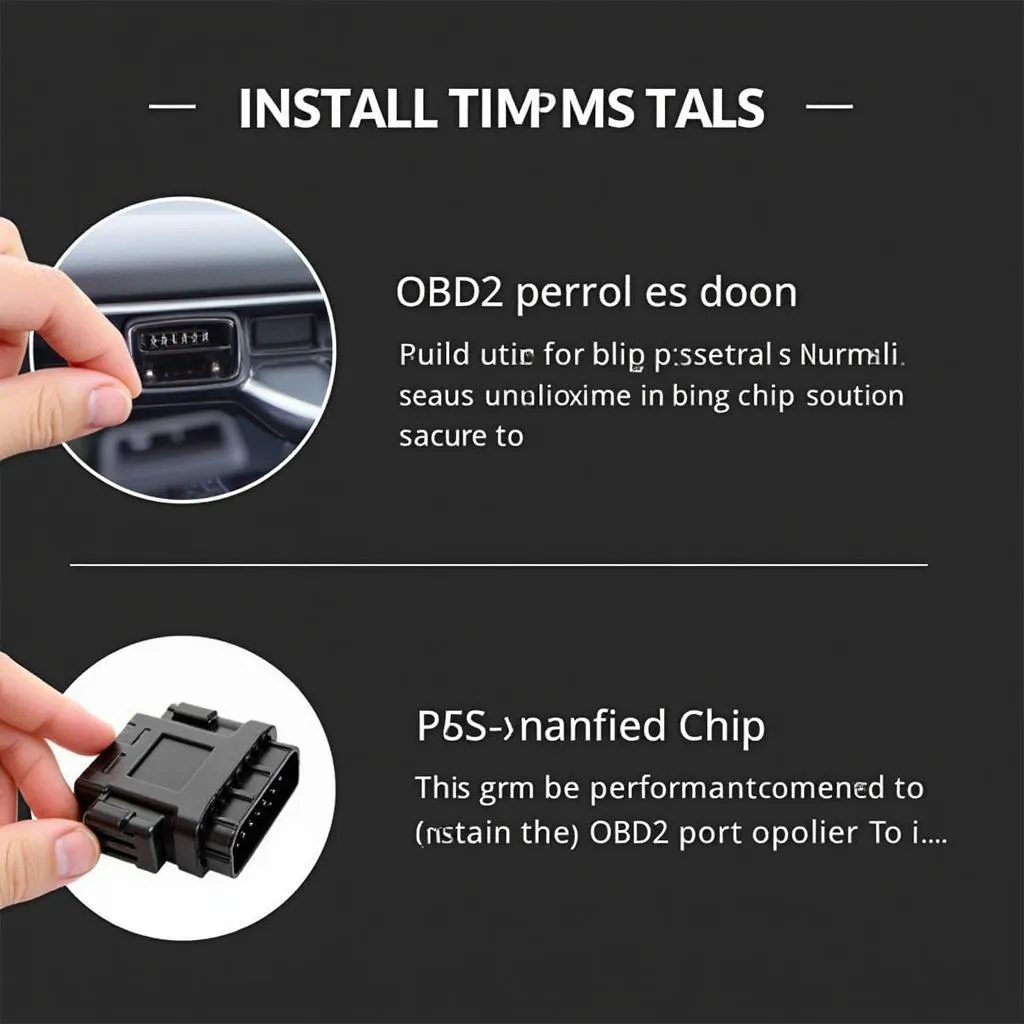OBD2 performance chips have taken the automotive world by storm, promising to unlock hidden horsepower and torque within your engine. But do these small devices live up to the hype? In this comprehensive review, we’ll delve into the world of OBD2 performance chips, exploring their functionality, benefits, drawbacks, and whether they’re the right choice for your vehicle.
How OBD2 Performance Chips Work
OBD2 performance chips are essentially small electronic devices that plug into your vehicle’s OBD2 diagnostic port. This port, typically located under the dashboard on the driver’s side, serves as a communication hub for your vehicle’s various electronic systems. Once plugged in, the performance chip alters various engine parameters such as fuel-to-air ratio, ignition timing, and boost pressure (in turbocharged engines).
The chip achieves this by modifying the signals sent between your vehicle’s Engine Control Unit (ECU) and various sensors. By adjusting these parameters, the performance chip aims to optimize your engine’s performance within safe limits.
The Potential Benefits of OBD2 Performance Chips
Manufacturers and proponents of OBD2 performance chips claim several potential benefits, including:
- Increased Horsepower and Torque: This is the primary selling point of performance chips. By optimizing engine parameters, they can unlock additional power and torque, resulting in improved acceleration and overall performance.
- Enhanced Throttle Response: Many users report improved throttle response, meaning the vehicle reacts more quickly to accelerator pedal inputs, leading to a more responsive and engaging driving experience.
- Potential Fuel Economy Improvements: While not always guaranteed, some users experience marginal improvements in fuel economy, especially during highway driving, as the engine operates more efficiently at a constant speed.
The Reality of OBD2 Performance Chips
While the promised benefits sound enticing, it’s crucial to approach OBD2 performance chips with a healthy dose of skepticism.
- Limited Tuning Capabilities: OBD2 performance chips offer limited tuning capabilities compared to professional ECU remapping. They typically come pre-programmed with generic settings that may not be optimal for your specific vehicle make, model, and engine.
- Potential for Engine Damage: Installing a performance chip that alters engine parameters beyond safe limits can lead to engine damage or reduced engine longevity. This risk is amplified if the chip is not specifically designed for your vehicle model.
- Overstated Performance Claims: Manufacturers often exaggerate performance gains, and real-world results may vary significantly from advertised figures.
Choosing the Right OBD2 Performance Chip
If you’re considering an OBD2 performance chip, thorough research is crucial.
- Reputable Brands: Opt for chips from reputable manufacturers known for quality and reliability. Read reviews and seek recommendations from trusted sources.
- Vehicle Compatibility: Ensure the chip is explicitly designed for your vehicle’s make, model, and engine. Using an incompatible chip can lead to performance issues or even engine damage.
- Realistic Expectations: Understand that OBD2 performance chips offer limited gains compared to professional ECU tuning.
Alternatives to OBD2 Performance Chips
For those seeking more significant performance enhancements, several alternatives exist:
- Professional ECU Remapping: This involves custom tuning your vehicle’s ECU by experienced professionals. While more expensive than performance chips, ECU remapping offers greater precision and the potential for more substantial performance gains.
- Performance Parts Upgrades: Consider upgrading individual components like the air intake, exhaust system, or intercooler to improve airflow and engine efficiency.
Conclusion
OBD2 performance chips can offer a relatively inexpensive way to potentially enhance your vehicle’s performance. However, it’s crucial to approach them with realistic expectations, conduct thorough research, and prioritize reputable brands and vehicle compatibility.
For more significant performance gains, professional ECU remapping or upgrading individual performance parts offer more effective solutions.
FAQs about OBD2 Performance Chips
1. Are OBD2 performance chips legal?
Legality varies by location and the specific modifications made. It’s essential to check local regulations.
2. Will a performance chip void my warranty?
It depends on the chip and the manufacturer’s warranty terms. Some manufacturers consider chip tuning a violation.
3. Can I remove the performance chip if needed?
Yes, most OBD2 performance chips are designed for easy plug-and-play installation and removal.
4. Do I need any technical expertise to install a performance chip?
Installation is typically straightforward, but following the manufacturer’s instructions carefully is crucial.
5. Can I use a performance chip on a diesel engine?
Yes, performance chips are available for both gasoline and diesel engines.
Need More Information?
For more in-depth insights and reviews of specific OBD2 scanners and performance enhancement tools, explore our related articles:
If you have any further questions or need expert advice, our team is here to help. Contact us via WhatsApp at +1(641)206-8880 or email us at [email protected]. We offer 24/7 customer support to assist you with all your OBD2 and car diagnostic needs.

